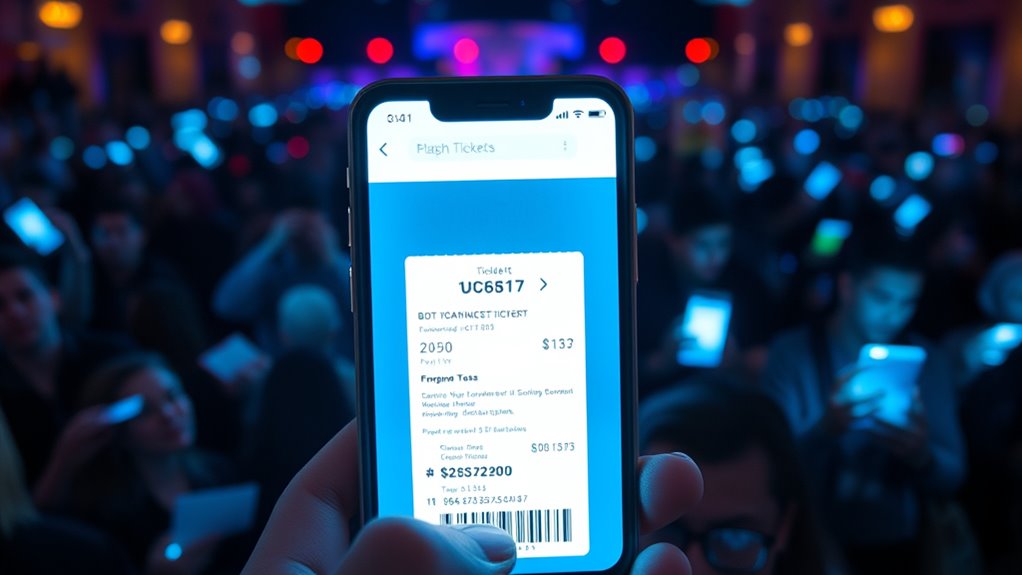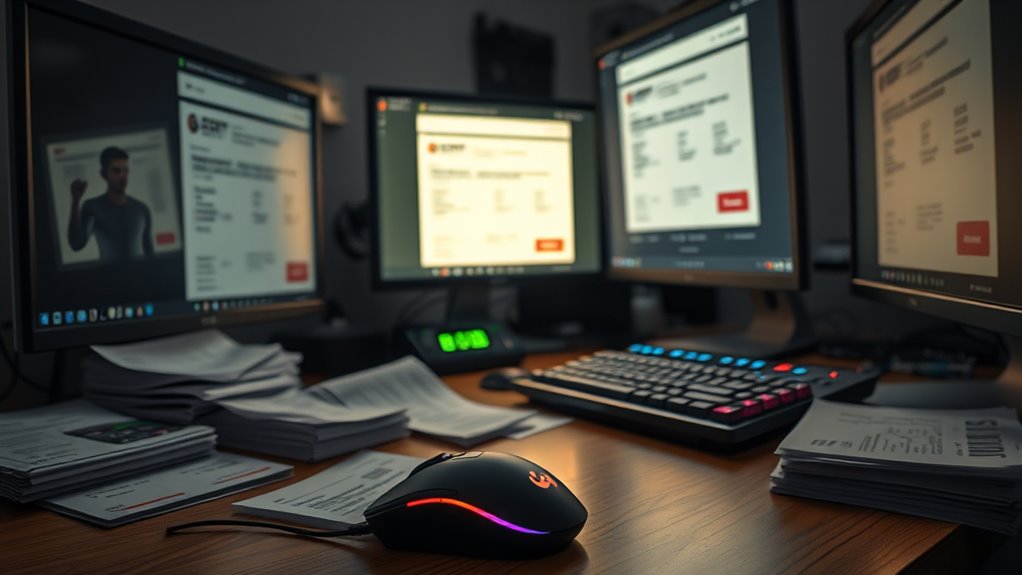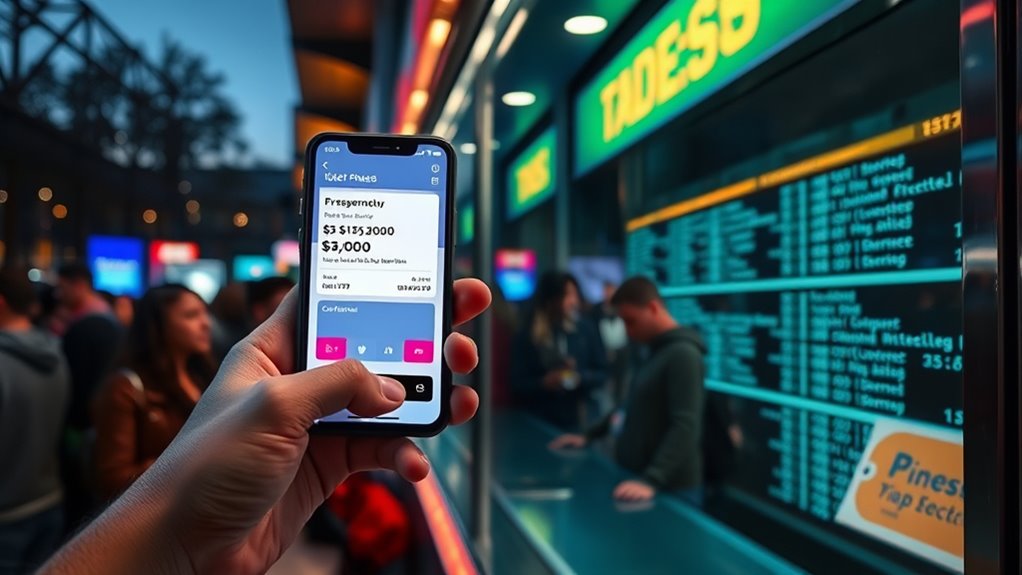Ticket bots use automation to buy tickets faster than genuine fans, raising serious ethical concerns. They shift access from loyal supporters to automated resellers, inflate prices, and create unfair market manipulation. Event organizers and regulators try to counter these tactics with security measures and laws, but the arms race continues. Balancing fair access with technological innovation is complex. To understand how this ongoing challenge impacts you and what solutions are emerging, explore the full picture.
Key Takeaways
- Ticket bots automate rapid purchases, unfairly excluding genuine fans and undermining fair access to events.
- Ethical concerns arise from bots manipulating the market, inflating prices, and favoring those with technical resources.
- Event organizers implement security measures like CAPTCHA and purchase limits to promote fairness and prevent scalping.
- Legal efforts aim to regulate bot use, but technological loopholes challenge enforcement of fair ticket distribution.
- Balancing innovation and fairness requires transparent, adaptive policies that protect genuine fans while embracing technological advancements.
The Mechanics Behind Ticket Bots

Ticket bots operate by automating the process of purchasing tickets faster than humans can. They rely on sophisticated ticket bot algorithms that analyze website patterns, detect release times, and execute rapid purchases with minimal delay. These algorithms are designed to bypass traditional security measures, often exploiting vulnerabilities in ticketing sites. When thousands of bots attempt to buy tickets simultaneously, they cause server overload, overwhelming the website’s capacity and slowing down or crashing the system. This overload prevents genuine fans from completing their transactions, giving bots an unfair advantage. Developers continually refine these algorithms to improve speed and evade detection, creating a constant arms race between ticket sellers and bot creators. Understanding this process highlights how automation manipulates ticket availability and accessibility. This ongoing competition exemplifies the challenges in maintaining fair access in digital spaces.
How Ticket Bots Affect Consumers and Fans

Because ticket bots can purchase large quantities of tickets in seconds, genuine fans often find themselves shut out of events they’ve fervently awaited. This leads to increased fan frustration, as many struggle to secure tickets at face value. Instead of supporting artists or teams, your chances of attending are diminished by automated resellers who buy up tickets for profit. Ticket reselling becomes rampant, making it difficult for fans to access affordable tickets through official channels. As a result, loyal fans feel alienated and discouraged from engaging with their favorite events. The presence of ticket bots shifts the playing field, prioritizing profit over fairness and making it harder for true fans to enjoy live experiences they’ve long looked forward to. Additionally, the use of professional-grade tools like advanced bots has made it increasingly challenging for event organizers to combat automated purchasing.
Ethical Concerns Surrounding Automated Ticket Purchasing

Automated ticket purchasing raises serious ethical questions about fair access, as bots often buy up tickets before genuine fans can get them. This practice can lead to market manipulation, driving up prices and making tickets unaffordable for most. As a result, authentic buyers are left frustrated, questioning whether the system truly serves everyone equally. Implementing fraud detection tools can help identify and prevent such automated purchases, promoting a more equitable ticketing environment.
Fair Access Challenges
While automated ticket purchasing systems can streamline the buying process, they also pose significant ethical concerns about fair access. You might notice that bots buy up tickets within seconds, preventing genuine fans from securing seats. This leads to three main challenges:
- Ticket resale: Bots often buy in bulk to resell at inflated prices, making it harder for average fans to afford tickets.
- Fan loyalty: When loyal fans are locked out, it damages their trust and connection to the event or artist.
- Unequal access: Automated systems favor those with technical knowledge or resources, creating an unfair playing field for everyone.
- The use of sophisticated projector technology in ticketing systems highlights how technical advantages can further skew access and fairness in the industry.
These issues threaten the integrity of ticketing, emphasizing the need for solutions that prioritize fairness and protect genuine fans’ access.
Market Manipulation Risks
Market manipulation is a significant concern when automated ticket purchasing systems come into play. Bots can exploit algorithmic bias, allowing them to target specific tickets or manipulate pricing, giving an unfair advantage over genuine buyers. This practice can distort market dynamics, making it difficult for fans to access tickets at fair prices. Additionally, the use of personal data raises data privacy issues, as ticket sellers often collect sensitive information to improve algorithms. If misused or unsecured, this data can be exploited for malicious purposes or sold without user consent. These risks underscore the ethical dilemma: while automation can streamline sales, it also opens the door to manipulative behaviors that undermine fairness and trust in the ticketing ecosystem. Furthermore, the presence of bots can lead to a decline in authentic customer engagement, as genuine fans struggle to obtain tickets, damaging the integrity of the sales process.
Impact on Genuine Buyers
Automated ticket purchasing systems substantially impact honest buyers by making it harder for them to secure tickets at fair prices. You might find yourself frustrated as bots buy up seats quickly, forcing genuine fans into high-priced ticket resale markets. This situation diminishes fan engagement and erodes trust in the ticketing process. Key issues include:
- Limited access to popular events, leaving true fans empty-handed.
- Increased ticket resale, inflating prices beyond affordable levels.
- Reduced sense of community and connection among fans due to unfair buying practices.
Furthermore, the prevalence of ticket scalping powered by automation damages the integrity of the event experience for everyone involved. These challenges undermine the core purpose of ticket sales—connecting fans with their favorite artists, teams, or events. Automated systems skew the playing field, making it tougher for honest buyers to participate fairly.
The Role of Event Organizers and Their Responsibilities

As an event organizer, you play a essential role in ensuring fair ticket access for all fans. You’re responsible for implementing security measures and bot prevention strategies to protect your ticketing system. How you manage these responsibilities directly impacts the integrity of your event and the experience of your attendees. Incorporating wall organization systems can also help streamline entry processes and enhance overall event management.
Ensuring Fair Ticket Access
Event organizers play a crucial role in ensuring that ticket access remains fair and equitable for all fans. You can do this by implementing policies that prevent ticket scalping and curb the influence of secondary markets. To promote fairness, consider these actions:
- Use official, transparent ticketing platforms to reduce scalping opportunities.
- Limit the number of tickets per purchaser to discourage bulk buying.
- Partner with authorized resellers to regulate secondary markets and prevent inflated prices.
- Incorporate accessibility features into the ticketing process to ensure that fans with disabilities or special needs are fairly accommodated.
Implementing Security Measures
To effectively combat ticket fraud and scalping, organizers must implement robust security measures that protect genuine fans and uphold fairness. This involves using advanced verification systems, such as identity checks or secure payment methods, to prevent bots from buying large ticket volumes. Strengthening ticketing platforms also deters scalpers by making it harder to acquire tickets through illegitimate means. Additionally, transparent communication with fans fosters trust and enhances fan engagement, showing that you prioritize fair access. Regularly updating security protocols ensures ongoing protection against emerging ticket scalping tactics. Incorporating automation’s role in business intelligence can help analyze patterns of scalping activities and identify suspicious transactions proactively. By taking these steps, you demonstrate a commitment to fair distribution, reduce scalping’s impact, and create a more positive experience for fans enthusiastic to access tickets legitimately.
Managing Bot Prevention Strategies
Effective management of bot prevention strategies hinges on the proactive role of organizers in implementing and overseeing security measures. You must balance robust protection with respect for user privacy. To do this effectively, consider these steps:
- Regularly update security protocols, ensuring data encryption keeps user information safe.
- Use advanced CAPTCHA systems that detect bot activity without compromising user privacy.
- Monitor ticket sales for suspicious patterns, adjusting anti-bot measures as needed.
- Incorporate security best practices from reputable sources to adapt to evolving threats.
Legal Perspectives and Regulatory Efforts

Legal frameworks and regulatory efforts are increasingly aimed at curbing the misuse of ticket bots, but they often struggle to keep pace with technological advancements. Many laws face legal loopholes that companies exploit to avoid accountability, making enforcement difficult. Governments and regulators are working to close these gaps through stricter legislation and clearer definitions of illegal practices. However, ensuring regulatory compliance remains a challenge, as ticketing platforms and bot operators often find ways to circumvent rules. Some regulations focus on transparency, requiring companies to disclose their anti-bot measures, but enforcement varies widely. Overall, while legal efforts aim to protect fair access, they need continuous updates to match the rapidly evolving tactics used by bot operators.
Technological Countermeasures Against Ticket Bots

Technological countermeasures are crucial in the ongoing fight against ticket bots, as they can adapt quickly to new tactics. You can implement methods like:
- CAPTCHA systems to verify human users during purchase, making automated buying harder.
- Dynamic pricing and randomized seat assignments to deter bots from securing multiple tickets for resale.
- Advanced algorithms that detect suspicious buying patterns, flagging potential bots and preventing large-scale ticket resale schemes.
Artists and event organizers are increasingly involved in supporting these measures, emphasizing fair access for fans. Such technological solutions help guarantee genuine fans get tickets and reduce the profit-driven resale market fueled by bots. While not foolproof, these tools are vital in maintaining ticket fairness and protecting the integrity of live events.
Striking a Balance: Fair Access vs. Innovation

Balancing fair access to tickets with the need for innovation is a complex challenge that requires careful consideration. You must weigh the benefits of new ticketing technologies against the risks of ticket scalping and the growth of secondary markets. While innovations like dynamic pricing can help reduce scalping, they might also create barriers for genuine fans. To illustrate, consider this table:
| Fair Access | Innovation | Impact |
|---|---|---|
| Prevents scalping | Enhances user experience | Risks excluding some fans |
| Limits secondary markets | Improves ticket security | May inflate prices |
| Ensures transparency | Offers more options | Could hinder resale markets |
Striking the right balance ensures genuine fans get tickets without fueling unethical practices or stifling technological progress.
Future Directions in Ensuring Equitable Ticket Distribution

As the landscape of ticket distribution continues to evolve, exploring innovative strategies is essential for creating a more equitable system. To achieve this, focus on three key approaches:
- Strengthening community engagement to guarantee local voices influence ticket policies.
- Implementing transparency initiatives that openly share how tickets are allocated and sold.
- Using technology to develop fairer distribution platforms that reduce bot interference.
Frequently Asked Questions
How Do Ticket Bots Impact Small or Independent Event Organizers?
You might notice that ticket scarcity makes it hard for small or independent event organizers to sell enough tickets, limiting their event’s success. When ticket bots flood the system, they reduce genuine fans’ access, harming event accessibility. This unfair practice prevents real attendees from securing tickets, making it tougher for small organizers to thrive. Ultimately, ticket bots create an uneven playing field, challenging the sustainability of independent events.
Can Ticket Bots Be Used for Malicious Activities Beyond Ticket Scalping?
Imagine ticket bots as digital pirates lurking in the shadows, ready to hijack more than just ticket sales. Their misuse can extend to malicious activities like hacking, spamming, or flooding systems with fake requests, causing chaos and disruption. You must recognize that beyond scalping, ticket bots can serve darker agendas, leveraging their automated power to commit malicious activities that threaten security and fairness in online spaces.
What Are the Privacy Implications for Consumers When Combating Ticket Bots?
When you’re fighting ticket bots, privacy concerns and data security come into play. You might be asked to share personal information to verify your identity, raising worries about how your data is stored and protected. It’s essential that companies implement strong security measures to prevent data breaches. You should also be aware of how your data is used and guarantee that your privacy rights are respected throughout the process.
How Do Different Countries Regulate or Address Ticket Bot Usage?
It’s no coincidence that countries approach ticket bot regulation differently. You’ll find some have strict legal frameworks, like the US and UK, with clear rules and penalties. Others struggle with enforcement challenges, especially in countries with limited resources or outdated laws. This variation impacts how effectively ticket bots are controlled, making it essential for you to stay informed about regional policies that could affect your access to events.
What Role Can Consumers Play in Promoting Fair Ticket Purchasing Practices?
You can promote fair ticket purchasing practices by engaging in consumer activism and supporting ethical purchasing. Share your concerns about unfair practices, advocate for stricter regulations, and choose platforms that prioritize transparency. By making your voice heard, you encourage accountability and help foster a market where tickets are accessible to all. Your actions can drive change, making the industry more equitable and discouraging the use of ticket bots.
Conclusion
Imagine trying to buy tickets for your favorite band, only to find scalpers with bots snatching them all up—like trying to catch fireflies in a jar. This chaos shows how ticket bots disrupt fairness and trust. As technology evolves, so must our efforts to keep ticket sales just and accessible. By working together—fans, organizers, and lawmakers—we can turn the tide and restore genuine access for everyone.









